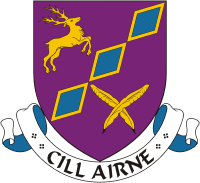Killarney: Difference between revisions
Knorrepoes (talk | contribs) m (Text replacement - "====Official blazon====" to "===Official blazon===") |
Knorrepoes (talk | contribs) m (Text replacement - "====Origin/meaning====" to "===Origin/meaning===") |
||
| Line 9: | Line 9: | ||
===Official blazon=== | ===Official blazon=== | ||
===Origin/meaning=== | |||
Killarney [=Cill Airne] means Church of the Sloes (<i>Prunus spinosa</I>). The church was one of three churches in the valley which were amalgamated in the early 1600s, possibly as a result of the suppression of the monasteries by Henry VIII. The three blue diamonds may represent these churches. Another explanation for the diamonds is the three Lakes of Killarney which have made the region the premier tourist site in Ireland since the mid 1800s. | Killarney [=Cill Airne] means Church of the Sloes (<i>Prunus spinosa</I>). The church was one of three churches in the valley which were amalgamated in the early 1600s, possibly as a result of the suppression of the monasteries by Henry VIII. The three blue diamonds may represent these churches. Another explanation for the diamonds is the three Lakes of Killarney which have made the region the premier tourist site in Ireland since the mid 1800s. | ||
Revision as of 19:47, 22 June 2017
KILLARNEY
County : Kerry
Official blazon
Origin/meaning
Killarney [=Cill Airne] means Church of the Sloes (Prunus spinosa). The church was one of three churches in the valley which were amalgamated in the early 1600s, possibly as a result of the suppression of the monasteries by Henry VIII. The three blue diamonds may represent these churches. Another explanation for the diamonds is the three Lakes of Killarney which have made the region the premier tourist site in Ireland since the mid 1800s.
The stag rampant in the upper right may represent one or both of the following: (a) the herd of red deer which has lived in the region for centuries and is the only herd of native deer in Ireland; (b) the O'Sullivans, a regional royal family that held sway in the Kingdom of Kerry in southwest Ireland from the 11th to the 17th century. Part of the O'Sullivan arms is a golden stag rampant.
The golden quills in the bottom right may represent either or both of the following: (a)the Annals of Inishfallen which is a history of the world written in 1010 AD by one of the monks resident in Muckross Abbey in Killarney. The Annals are now held in the collection of Oxford University in England; (b) The Four Poets of Kerry, a group of poets who flourished in the late 16th and early 17th centuries and were the last of the Old Irish bards. The Four are buried in Muckross Abbey.
Contact and Support
Partners:
Your logo here ?
Contact us
© since 1995, Heraldry of the World, Ralf Hartemink 
Index of the site
Literature : Image taken from http://www.iol.ie/~kudc/. Background provided by Brian Halton, USA










